“I Sit on Acid” is one of these songs that has defined a period and a genre. It’s also an incredible club banger and live it’s something really crazy. Today, we talk with Maurice Engelen, also known as Praga Khan and the man behind Lords of Acid and a lot of other projects. The first concert of the band in Spain will be on the 25th of October, at the DarkMad festival.
—We have just talked about new beat with a A Split Second, and you are considered one of the pioneers of this scene. What did it mean to you?
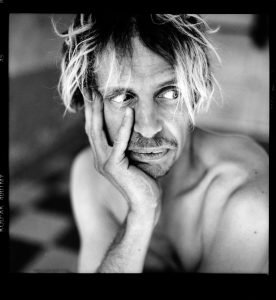 —Early 1988, a musical phenomenon called New Beat took Belgium by storm. New Beat was the first and last genre to be exclusively associated with Belgium. At that moment, I was running an independent record company, Antler Records. In the early eighties, we released a lot of electronic body music on the label (The Klinik, A Split Second, Poesie Noire, Neon Judgement, Siglo XX, Snowy Red amongst others). In 1987, when New Beat started, I realised that this was a once-in-a-lifetime opportunity. Belgian dance music was gaining popularity worldwide and got hyped all over the international music press. At the beginning of 1988, there were only a few New Beat records available to the DJs. So I built 3 more recording studios and hired young dance producers to produce New Beat records. The artists who were producing these records could make a living out of music and were able to invest in home studios. The fact that New Beat was banned from national radio contributed to the record sales. If anyone wanted to hear New Beat, they had no choice but to go to the clubs or else, to the record store. New Beat was the start of a successful new generation of dance producers, who would become very important in the future of Antler-Subway. During the heyday of New Beat, the company grew from a handful of employees in 1987 to 22 full-time employees in 89 with offices in Belgium, Holland, the US and the UK.
—Early 1988, a musical phenomenon called New Beat took Belgium by storm. New Beat was the first and last genre to be exclusively associated with Belgium. At that moment, I was running an independent record company, Antler Records. In the early eighties, we released a lot of electronic body music on the label (The Klinik, A Split Second, Poesie Noire, Neon Judgement, Siglo XX, Snowy Red amongst others). In 1987, when New Beat started, I realised that this was a once-in-a-lifetime opportunity. Belgian dance music was gaining popularity worldwide and got hyped all over the international music press. At the beginning of 1988, there were only a few New Beat records available to the DJs. So I built 3 more recording studios and hired young dance producers to produce New Beat records. The artists who were producing these records could make a living out of music and were able to invest in home studios. The fact that New Beat was banned from national radio contributed to the record sales. If anyone wanted to hear New Beat, they had no choice but to go to the clubs or else, to the record store. New Beat was the start of a successful new generation of dance producers, who would become very important in the future of Antler-Subway. During the heyday of New Beat, the company grew from a handful of employees in 1987 to 22 full-time employees in 89 with offices in Belgium, Holland, the US and the UK.
—What were your influences when you started making music?
—I don’t know what influenced me specifically because I was listening to a lot of different stuff. From punk to disco, from New Wave to heavy metal. I think that molded me into what I do now.
—Your first project was Shakti, right? How did you get into electronic music?
—That must have been in the mid-seventies. I started discovering the German electronic music. The early Tangerine Dream, Klaus Schulze, Can, Kraftwerk, all those groups were found in my record collection. My transition from record company owner to musician came in 1986 when Atari launched the ST version, a computer every musician wanted to own. I’ve always been fascinated by technology and this invention was right up my alley. Soon I had my first home-recording studio and it turned out that combining my passions for music and technology was the perfect fit for me. That same year I’ve made my first project Shakti, my career as a recording artist was launched.
—In 1987, you also released a single called Blow Job (It’s Hard to be President) under the 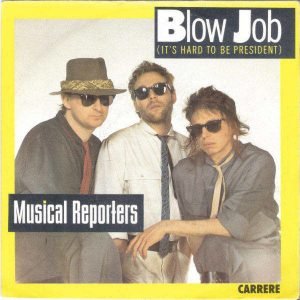 project Musical Reporters, right? Your music has always been famous for its sexually explicit lyrics. Did you ever have problems with censorship?
project Musical Reporters, right? Your music has always been famous for its sexually explicit lyrics. Did you ever have problems with censorship?
—Yeah, we had a lot of crazy things happen to us on tour. Back in the 90s we did a show in San Diego and before we went to the show our tour manager told us the sheriff wanted to talk to us, because back then it wasn’t like now with every rapper talking about vaginas, it was controversial then. The sheriff came onto the tour bus with a list of 60 things we couldn’t do on stage. I still have that list somewhere. One of the things was that you can’t use the microphone in a sexual way or something. Yeah, it was a lot of rules and I asked the sheriff: do you want me to sign this? If I signed it, would be impossible with our show. So I just covered myself and signed it, I went on stage scared a little. It was a lot of fun too, on the left of the stage we had cops and on the right of the stage we had cops, and they were having the time of their life onstage with Lords of Acid and all the girls while we played “Pussy”. A lot of people have told me over the years that by listening to Lords of Acid they could express their sexuality. There’s nothing wrong in singing about sex. At the end of the day sex is the most normal thing in the world. It may be one of the few things that we all have in common.
—Major Problem released Acid Queen in 1988. It’s considered to be the first single of Lords of Acid, right? Was MP a more stable formation from which Lords of Acid were born?
—Major Problem was one my projects on the Kaos Dance label. In those days every production team had dozens of projects. It was a very creative time with the potential to sell a lot of records and to experience a lot of fun. The Belgian music scene was booming. At the same moment, Acid House music was becoming popular in London with illegal raves popping up in disused warehouses. I really loved the squelching sounds and deep basslines of the Acid House Music (Roland TB-303) but it had nothing to do with New Beat, so I came up with the idea to blend Acid House with New Beat. It sounded way different than a regular New Beat record or a typical Acid House record. That’s when I decided to launch another sublabel, named Kaos Records. Kaos gave me the freedom to experiment with this new style, which was a mixture between New Beat and Acid House. I called it Hard Beat. Most of the records on the Kaos catalogue were made in a short period of time by the same production team. Lords of Acid and Major Problem were two of the projects in this style of music.
—In the song “I Still Have a Dream,” another single of Major Problem, you used the voice of Fan Dl Kaos of Flash Zero. Can you please tell us more about this collaboration?
—I’ve always been a fan of Manolo (Flash Zero) and it was a real honor for me to have his vocals on the “I Still have a Dream” record, a trend-setting record of its time. I will be very happy to see him again at the DarkMad festival.
—Why did you release your records under so many different names?
—Back in the 80s, I was in a lot of projects, because I was very creative and I couldn’t wait six months to bring out another effort. Praga Khan was one of those names and so were Lords of Acid. I probably had 25 projects. That Sit on Acid record took off, and people asked me to tour, so I had to think of a name.
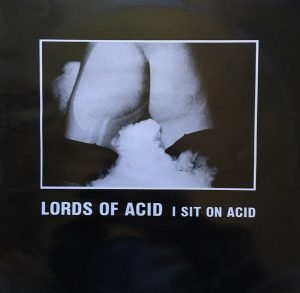 —I sit on Acid was released in 1988, this time as Lords of Acid. How was the genesis of this classic song?
—I sit on Acid was released in 1988, this time as Lords of Acid. How was the genesis of this classic song?
—It’s something you can see in different ways. You can see it in a sexual way, but you can see it in a drug way. We just wanted to play with the lyrics. Like the song “Pussy,” when you’re an innocent kid there’s nothing wrong with it, but when you’re an adult and you listen to it, it’s something else. That’s really what I like – teasing people and trying to check out how far I can go. The good thing about Lords of Acid is that, over the years, we could always play all ages shows. Other bands who would copy Lords of Acid – because it was successful and they thought that’s what they had to do – would take it a little bit further. But when you take it further, then it loses the humor. That’s always been very important to Lords of Acid – that it’s not over the top. It’s tongue-in-cheek humor. When you’re a band and you try to copy Lords of Acid and you take it further then it becomes cheap. It needs to be funny. It was a problem – we didn’t do a lot of concerts in Belgium or in Europe because people all came out to see a sex show. If you want to see a sex show, you’d better go to a sex club. With the shows we’ve always tried to create a social experience. People get dressed up and they’re part of the show.
—Lust from 1991 was recorded in 3 weeks. Did you ever imagine that it would become a classic?
—It all started with the success of “I Sit on Acid” in the US. We then got a call from Caroline Records asking us to make an album we said we could but we were touring as Praga Khan in Japan. We said we would be back around Christmas but had to leave again around January 15th for our UK tour, we went into the studio and did one song every day. The same thing happened with the Mortal Kombat album with The Immortals.
—In Voodoo-U from 1994 and Our Little Secret, from 1997 the sound is a bit more industrial. Did you think that you had done everything in New Beat?
—In those days, Lords of Acid’s music was a combination of the late New Beat/early techno sound and the US industrial sound. We used the bass lines and synth riffs of the European sound and added industrial guitar sounds. This created a new sound. In 1994, when Voodoo-U got released, I got a lot of phone calls from famous American rock stars who were raving about the album. To me it was just a logical step in the evolution of the sound of Lords of Acid.
—Farstucker, the album from 2001, was a bit more rock instead. Lords of Acid has changed a lot through the years, don’t you agree?
—I’m always looking for new challenges, and I try to make each album different. At the end of the day, it’s still dance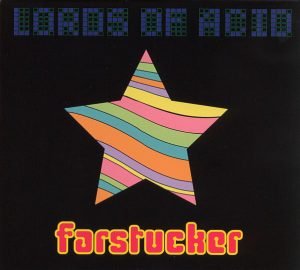 music, and if you use techno sounds of rock sounds…. A lot of people think dance music is disco. But to me dance music is anything you can dance to. Salsa and Rhumba are dance music. I don’t see why Iggy Pop’s “The Passenger” isn’t dance music and punk. I always try to experiment with styles, and I don’t want to put myself in a position where I can’t do this or that because I don’t like restrictions. If I’m restricted, I can’t be creative anymore. I do what I feel, and what I feel is what I do. That’s why it always sounds new and innovative, because I try to keep up with the newest sounds. I’m a music addict, and I listen to a lot of stuff going on. What makes Lords of Acid special is that there are no rules. We did a country song called “Don’t Kill for Love,” we did a reggae song, “Marihuana in your Brain,” we did drum and bass with the song “Voodoo-u.” We can do whatever we want as long as there’s a Lords of Acid sauce over the top.
music, and if you use techno sounds of rock sounds…. A lot of people think dance music is disco. But to me dance music is anything you can dance to. Salsa and Rhumba are dance music. I don’t see why Iggy Pop’s “The Passenger” isn’t dance music and punk. I always try to experiment with styles, and I don’t want to put myself in a position where I can’t do this or that because I don’t like restrictions. If I’m restricted, I can’t be creative anymore. I do what I feel, and what I feel is what I do. That’s why it always sounds new and innovative, because I try to keep up with the newest sounds. I’m a music addict, and I listen to a lot of stuff going on. What makes Lords of Acid special is that there are no rules. We did a country song called “Don’t Kill for Love,” we did a reggae song, “Marihuana in your Brain,” we did drum and bass with the song “Voodoo-u.” We can do whatever we want as long as there’s a Lords of Acid sauce over the top.
—Lords of Acid last album, Pretty in Kink, published in 2018, was funded using Kickstarter. Do you think that crowdfunding is the best ways for releasing an album nowadays? What can you tell us about the album too?
—The making of Pretty in Kink, for me, was completely different. It was great to have cooperation between myself and the fans. The fans were involved from the start, from the beginning of the recording up through the final mix of the album. The involvement went from choosing the title of the album, choosing the subjects of the songs, and being asked their opinions about demos. They were really with me the whole time. It was interesting because I also asked them a lot of stuff, doing polls like “What’s your favorite Lords of Acid album?” and “What’s your favorite song?” It was very creative. I got a lot of feedback from diehard fans.
—Lords of Acid had a lot of different lead singers/front women in the past. Was if difficult to find the right person?
—Our new Singer is from Belgium, and for me, it was good to have someone from Belgium because in the past, when I’ve worked with American singers, it’s like a long-distance thing. They need to record it in LA and send it over. It’s always so much easier if you’re together in the studio. We had the time to record demos, go back home to listen to them and get into the song, and then record it for real. Plus, the thing with this new singer, Marieke Bresseleers—her nickname is “Little Bloody Mary”—of all the people I’ve worked with, she has the widest vocal range. She can go really high, she can go really deep, but still be very warm. It was nice to work with a singer who is classically schooled as then you can do more.
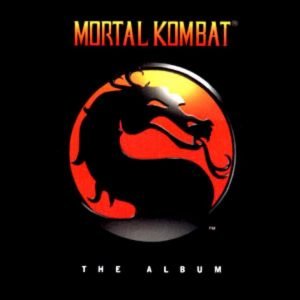 —With one of your projects, The Immortals, you made the soundtrack for the videogame Mortal Kombat. What can you tell us of this experience?
—With one of your projects, The Immortals, you made the soundtrack for the videogame Mortal Kombat. What can you tell us of this experience?
—That’s a strange story. We were touring in Japan, and we got a phone call from America. I’m a gamer myself, and they knew I was a gamer, and they asked me if I had the opportunity to write an album for a new game called Mortal Kombat, coming out in fall, if I would do it. So I said I would if they would send me a console with what they had of the game so far. That was crazy because I received the game, but there was a lot of stuff still missing with the programming. I could play the game but only in the early stages. But by doing that, I learned to know the characters and got a lot of inspiration. It only took us a couple of weeks because we’d play the game and go to the studio, and then repeat the process.
—Next year, you are going to tour also under your Praga Khan alias, are you going to release any new album?
—There’s not really a new album in the planning at this moment. Next year’s March and April there will be a new North American tour where we will play a kind of a double bill. 32 cities – Lords of Acid and Praga Khan. Fans in the US will really appreciate it. They’ve been following my career for so many years and it’s 20 years ago since we played a Praga Khan show in the US. They are so looking forward to the hear the Praga Khan solo stuff live.
—You were a judge in X Factor. Imagine being in this talent show in 1988, and having Lords of Acid as contestants. What would you have said about them?
—That’s a difficult question. I have no idea. Being a judge in X Factor was a once in a lifetime mistake. X Factor is a TV format and too bad shows like this purposely try to make contestants look foolish for their own benefit.
—How is going to be Lords of Acid’s concert at DarkMad?
—With this tour, I’m trying to keep it as pure as possible because the thing is that, most of the time when people come to see a Lords of Acid show, it’s like a total experience with lots of projections, and lots of props and all that stuff. I want to do it differently this time. So the version we have this year is a purer rock and roll version of Lords of Acid. The musicians really like this. Every time we come off stage, we are like, wet from the energy, sweating like crazy. It’s a lot of fun and of a lot of energy.




2 comments
Awesome interview with one of my favorite artists and bands I can’t wait for the tour its gonna blow everyone’s mind
Thank you Chad 🙂